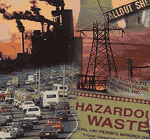Even as environmental groups in India scramble to advice the Narendra Modi government on how to frame its environment policy, a report in Science magazine has cast a dark shadow over the world.
Science, an American peer-reviewed journal founded in 1880, has published a study which shows that human activity is leading to species extinction at a rate that is a thousand times faster than the natural rate.
The study, led by conservation expert Stuart Pimm, describes the situation as alarming and warns that unless drastic action is taken the earth will be in the midst of the sixth mass extinction since the planet came into being.
While mass extinctions in the past were caused by natural events, the one unfolding is a consequence of unprecedented population explosion and industrial expansion. As species extinction accelerates, so does the likelihood of eco-systems becoming unstable. In this context the effort to keep the GDP growing will become unviable.
Yet recommendations submitted to the new government by two notable Delhi-based environmental think tanks make no mention of biodiversity or species extinction.
Both The Energy Research Institute (TERI) and the Centre for Environment and Science (CSE) have quite rightly focused on offering detailed advice to the new government on matters that have more immediate life or death implications.
For instance, the TERI note points out that more than 73 million workdays are lost each year in India on account of water-borne infections. It adds that India suffers economic losses of Rs 5,400 crore each year due to poor sanitation.
The CSE quotes a WHO report which shows that 13 of the 20 worst polluted cities across the world are in India. The World Bank has estimated that the health cost of particulate matter pollution accounts for 3% of India’s GDP.
It is natural that both TERI and CSE have focused on suggestions that address these immediate problems – which are indeed the need of the hour. They are also circumscribed by the prevailing discourse on politics and economy which is dominated by the need to grow the GDP.
By comparison biodiversity may seem like a relatively remote problem. And calling for a ‘paradigm shift’ that redefines growth may not seem like a winning idea.
But that’s where the future is. Otherwise all of us are at risk of being an endangered species.
Rajni Bakshi is the Gandhi Peace Fellow at Gateway House: Indian Council on Global Relations.
This blog was exclusively written for Gateway House: Indian Council on Global Relations. You can read more exclusive content here.
For interview requests with the author, or for permission to republish, please contact outreach@gatewayhouse.in.
© Copyright 2014 Gateway House: Indian Council on Global Relations. All rights reserved. Any unauthorized copying or reproduction is strictly prohibited


